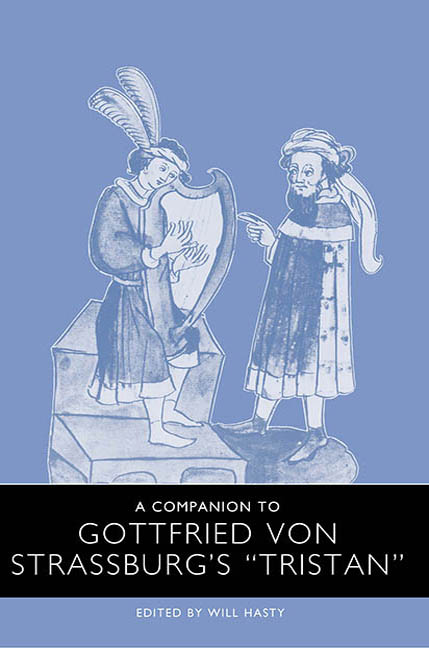Book contents
- Frontmatter
- Contents
- Acknowledgments
- Introduction: The Challenge of Gottfried's Tristan
- I Cultural and Social Contexts
- II Figures, Themes, Episodes
- Gottfried's Adaptation of the Story of Riwalin and Blanscheflur
- This Drink Will Be the Death of You: Interpreting the Love Potion in Gottfried's Tristan
- God, Religion, and Ambiguity in Tristan
- The Female Figures in Gottfried's Tristan and Isolde
- Performances of Love: Tristan and Isolde at Court
- Duplicity and Duplexity: The Isolde of the White Hands Sequence
- III Gottfried's Narrative Art
- IV The Medieval and Modern Reception of Gottfried's Tristan
- Notes on the Contributors
- Index
God, Religion, and Ambiguity in Tristan
from II - Figures, Themes, Episodes
Published online by Cambridge University Press: 28 April 2017
- Frontmatter
- Contents
- Acknowledgments
- Introduction: The Challenge of Gottfried's Tristan
- I Cultural and Social Contexts
- II Figures, Themes, Episodes
- Gottfried's Adaptation of the Story of Riwalin and Blanscheflur
- This Drink Will Be the Death of You: Interpreting the Love Potion in Gottfried's Tristan
- God, Religion, and Ambiguity in Tristan
- The Female Figures in Gottfried's Tristan and Isolde
- Performances of Love: Tristan and Isolde at Court
- Duplicity and Duplexity: The Isolde of the White Hands Sequence
- III Gottfried's Narrative Art
- IV The Medieval and Modern Reception of Gottfried's Tristan
- Notes on the Contributors
- Index
Summary
1
Die frage des verhältnisses der Tristandichtung zum Christen-tum ist das schwierigste und vielschichtigste Problem der Tristan-forschung” (The question of the relationship of the Tristan poem to Christianity is the most difficult and multi-layered problem of Tristan research). So wrote Reiner Dietz in his 1974 survey of Tristan scholar-ship (152), and his statement would be equally true today. Over the past decades, indeed centuries, many distinguished medievalists have pondered issues such as Gottfried's concept of God and his dealings with people, the role he assigns to religious ideas and practices in his vision of society, and, above all, the complex and deeply ambiguous relationship he suggests between the love of Tristan and Isolde on the one hand and contemporary models of love between human beings and God on the other. As yet, however, nothing approaching a consensus has been reached.
All bar the most recent research on these and related subjects is summarized by Picozzi (1971, in English), Dietz (1974), Langmeier (1978), and Weber/Hoffmann (1981); so it should suffice here to offer merely a brief introduction to the main schools of thought, before proceeding to detailed textual analysis of Tristan itself. The earliest school is associated with one of the greatest of all nineteenth-century Germanists, Karl Lachmann, who in 1820 memorably and influentially denounced the work in the following terms: “anderes, als Üppigkeit oder Gotteslästerung, boten die Haupttheile seiner weichlichen, unsittlichen Erzählung nicht dar” (the principal sections of his soft, immoral story offered nothing apart from voluptuousness and blasphemy; Lachmann 159). Such orotund condemnations are of course no longer current in scholarly circles, but the notion of at least parts of Gottfried's romance (notably the ordeal scene) evincing, if not a blasphemous, then at least a skeptical attitude towards religion persisted well into the twentieth century, when it was enunciated by, amongst others, Hans-Günther Nauen (37–38 and passim), Th. C. van Stockum (25–26) and, more recently, Werner Schröder (65).
A radically different view of Gottfried's religiosity was proposed in 1915 by Ulrich Stökle, whose dissertation offers an abundance of at times naïvely interpreted evidence in support of the view that Gottfried was not just theologically orthodox but possibly a priest (104).
- Type
- Chapter
- Information
- A Companion to Gottfried von Strassburg's Tristan , pp. 113 - 136Publisher: Boydell & BrewerPrint publication year: 2003



